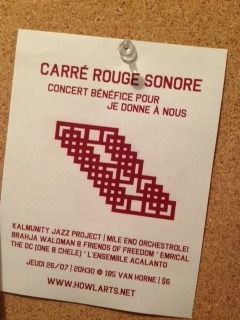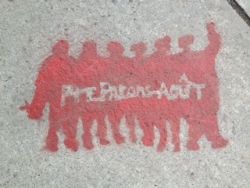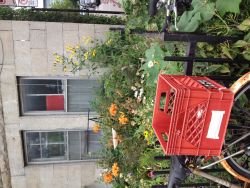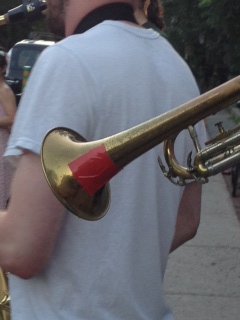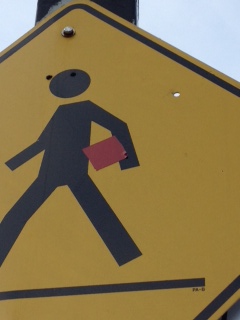Coop média de Montréal
Journalisme indépendant
Revving up for August, Montreal, Night 94
It's a bit after midnight, and I just got home from a perfectly curated musical fund-raiser in the Mile-End neighborhood of Montreal titled carré rouge sonore ("red square sound") organized by HOWL! arts collective. HOWL! was also largely responsible for dreaming up the Rêve général illimité ("unlimited general dreams/strike"), an unpermitted creative intervention during the Jazz Festival and hopefully another version will take place before the start/nonstart of schools here in Montreal on August 13. From what I've seen so far, HOWL! doesn't sit back quietly but instead tries to use the language of cultural creation to voice political aspirations for a new world, as tiny as those voices might be right now or even for a long while to come. Social change is hard work. So conversely, it should be pleasurable hard work -- or at least that seems to be part of the unspoken aim of HOWL! This arts collective doesn't ask permission from arts councils or cops; rather, it imagines what music, say, might sound like in an altogether different form of social organization -- one premised on what's been facilitating and sustaining this student strike: direct democracy in various forms. (For those of you agitating just south of here, in that place still called the United States, and maybe even folks outside this Francophone province, please take heed: if anything is key to this strike, it's the long-lived legacy, infrastructure, and practice of face-to-face decision making -- not easily replicated quickly, but necessary nonetheless.)
For example, the École de la Montagne Rouge crew, made up of still-striking students who are still making posters and other brilliant (and often brilliant red) visuals for a social movement instead of sitting quietly in rows of chairs in a classroom, brought their own collective envisioning of red squares to this musical fund-raiser by designing the logo (http://www.flickr.com/photos/stefanchristoff/7625011812/).
Such infinite dreams, of course, are largely circumscribed by the present culture industry, but nights like tonight show that a few stray notes that can't quite be captured by the capitalist logic manage to slip through to a few eager ears and open minds -- many of them opened by the student strike itself. At the "red square sound" event, I ran into still-striking students who are busy taking gorgeous photos and writing indie news accounts for this social movement, or further discovering anarchism by recently taking a road trip to the Anarchist People of Color convergence in New Orleans; there were teachers there, also strike allies, and Mile-End popular assembly folks who are busy organizing a "casseroles and orchestrole" go downtown to illegal night demo 100 this coming Wednesday, August 1 (http://www.facebook.com/events/408425942526577/), and an August 10 "Mile-End Bloc(k) Party: Toward a Social Strike" (http://www.facebook.com/events/408559369180806/) -- basically, hopefully, a large (perhaps red) square of street turned into an open-air classroom to illustrate what free education looks like, via a festive direct action in disobedience of special law 78, and to let the students know that the neighborhood assemblies are behind their strike, just ahead of the start/nonstart of their schools. It, in turn, emerged out of a call from the St. Henri popular assembly for a "day of action" in neighborhoods on August 10, building toward the notion of social strike in complement to student strike and, again, also just making visible popular support for the students, so they don't feel alone. So they aren't alone.
If the major student association, and the most radical and bottom-up one, CLASSE, has anything to do with it, its August 10 evening gear-up for the August 13 week "class or no class" -- Nous sommes avenir (approximately, "We are the future"), http://www.facebook.com/events/422915807747262/ -- will draw hundreds or thousands together to make that plain for all to see. Oh yeah, and then there's the callout for an international convergence in Montreal to support the Quebec student strike during the week of August 13 to 17 (http://bloquonslarentree.com/node/12). [Update: I could start adding a lengthy string of student and social strike organizing here, often starting to overlap in people's enthusiasm to organize, which is a good "problem" to have in a social movement if one thinks about it. Indeed, as of the afternoon after I wrote t his piece, there are now three separate calls for neighborhood casseroles and orchestroles to converge at the night 100 demo, and a 6 p.m. call by Anarchopanda to also do a solidarity demo in front of the Russian Consultate for the Riot Pussy women in jail. Somehow I imagine it'll all work out, since after all, it's great that there's such widespread popular support for what's called a "social" or "popular" struggle, and the point was to demonstrate to the students and greater public that neighborhoods, too, are behind the strike!]
Tonight's sounds of the red square displayed a preview of this togetherness. It included the music of resistance, from jazz to the first-ever indoor orchestrole (with loaner cookware on hand, so others could join in, loudly and boisterously) to hip-hop to protest chant in between, amid a room full of red squares and rabble-rousers. Despite the forecast of rain, it turned out to be a lovely evening here in Montreal to raise legal funds for the Quebec striking students. Those funds are signaled by another graphic play on the red square in the logo of the legal helpers je donne à nous (http://www.jedonneanous.org/accueil.html), a group that's still gladly taking contributions for the coming storm of riot police and, as rumor has it, actual implementation of special law 78 when school soon starts/doesn't start come August 13 onward.
The benefit was held in a neighborhood collective space, which felt both part homey, part social center. It was only a block or so from where the autonomous popular assembly of Mile-End met earlier tonight, in a local cafe that itself features local musicians all day until closing time at 6 p.m. Due to the potential of wet weather, the cafe folks loaned their space for this fledgling experiment in neighborhood direct democracy. There, in week 6 of so of our assembly, old faces and new ones heard a presentation by one assembly participant -- also a lawyer -- on special law 78. We'd decided this at last week's assembly after doing a go-around of the some 45 or so people in attendance at our usual outdoor park spot about how we, as a popular assembly, wanted to lend support to the likely still-striking students when they likely try to keep their schools shut during the increasingly key week of August 13-17, when some 13 schools are supposed to open by law -- backed by the force of this new special law 78 that seemingly makes any kind of dissent criminal, including probably all neighborhood assemblies. We offered our views on comfort levels around "green, yellow, and red" zones, or levels of potential risk of arrest, and then seemed to concur that such designations would more likely be up to the police, not us. Banging a saucepan, for example, could flare into "red" in cop's eyes. Wearing a red square that week could fuel the same overreaction on the police's part. But despite varying degrees of worry over risk and the law, our go-round last week showed strong support for us tangibly supporting the students, though it's unclear what that will look like other than, for now, remaining open and flexible, and creating as many links and lines of communication as we can between other neighborhood and student assemblies.
It's not that we can't start imagining various things we could do; rather, it's because everything and everyone has to wait on the individual schools (and sometimes individual departments within schools) to hold their own student assemblies to decide whether to continue the strike or not, and if so, how. In what's becoming a nail-biter moment for this social movement, student assemblies largely don't convene until the few days before the start/nonstart of schools that August 13 week.
This nervous anticipation translates into low-grade inklings of what's to come. For example, one of my friends who organized tonight's fund-raiser said he got stopped by a cop yesterday for allegedly jaywalking some "three blocks away," when clearly the cop couldn't possibly see that far to spy the alleged infraction of the social order. When my friend asked if he was actually being stopped because he was wearing the red square, the cop's face pretty much confirmed it. But it's not just the cop versus people tension that emerging right now; it's also the clock ticking away toward August, and how much needs to be decided, directly, before those school doors are supposed to open (or not) for classes. If Facebook is any indication of anything, student-strike-related invites are piling up and indeed overlapping for all things rebel red starting August 1, that pivotal day 100 of illegal contestation night after night in Montreal's streets -- a small count, relatively, compared to the soon six-month-old student strike.
Earlier this afternoon, I got a feel for the weight on the shoulders of these students, many of whom are probably pretty new to politics and also likely now have become fast learners and incredibly savvy at striking. Most of them have blocked many a door, seen many a riot cop up close, and gone miles on many an illegal demo, not to mention gotten really good at self-governance -- or better than average, at least. I went and sat in on today's UQAM strike council of some 75 people, give or take, mostly students (though most students are still away on break) in a lifeless UQAM lecture hall, but the room was brought to liveliness by the discussion -- a bit slowly, though, since no one seemed to step up to facilitate what was clearly an informal direct democracy today. Brainstorming about everything from how to block classes to what logistics are needed to organizing solidarity demos, it suddenly became clear that this was an enormous puzzle given all the schools meeting as assemblies to decide whether to stay strong on their strike and then opening/not opening their schools within a tiny window of time in mid-August. The brainstorm also showed that nearly every school, for various reasons, thinks it is deserving of extra support, which of course is probably true.
Someone suggested they create a giant "calendar" on the chalkboard, which only underscored the incredibly complex communications and organizational task ahead. For instance, 4 schools open on August 13, and many of the schools are nowhere near each other geographically. How to communicate what all the student assemblies decide (including one that is supposed to meet the same day that the students are supposed to return to their classes at that school) to all the other schools, and all the students, and all the neighborhood assemblies, teachers, parents, allies, media, and the list went on. After some 45 minutes of trying to even begin to figure out a calendar, the task of doing so seemed to be abandoned in favor of trying to talk about the communications and organizational quagmire.
I had to leave to get back for the Mile-End popular assembly, but the council meeting reminded me that, first, this strike is remarkable in that given all this complexity, the students have so far figured it out and stayed on strike, using these face-to-face decision-making structures; and second, as this sidewalk stencil from Mile-End urges, there's a need to: "Prepare for August!"
Or better still, as this poster around Montreal proclaims: "On August 13. The Strike Continues."
Or rather, both are true: there's the need to prepare, and near impossibility of truly preparing given all the variables (elections, student assemblies, popular assemblies, police, special law, public opinion and especially material support, and the list goes on), and yes, it looks highly probably that the strike will continue nonetheless. There's an increasing cascade of meeting dates for neighborhood popular assemblies, anticapitalist consultas and a brunch, student and teacher association assemblies, and I imagine affinity groups -- all intent on following the autonomous lead of the students, being in solidarity with each other, and offering tangible assistance of all kinds.
For now, as July draws to a close, so much radical subversion is being debated, imagined, and enacted through collectives and assemblies -- the imperfect practice of what created a strike, what might let it go forward, and what might be its historical contribution more than anything else.
And likewise, so much of this radical subversion is being read through the tiny little red square. Sometimes, like in the photo below from much earlier today, taken on my walk to the UQAM strike council, all the eye thinks it sees is the pleasurable aesthetic of intended square converging with an accidental one, or the randomly lovely visual of this symbol in all sorts of places and spaces across the urban landscape, so quiet now during the two-week summer holiday that hits Montreal at the end of July. (In fact, there's basically a voluntary "social strike" of sorts already going on, since many businesses simply close altogether for these two weeks and go on holiday too -- making it maybe a little easier for folks to perhaps imagine what a social strike would look or feel like: leisurely noncompulsion, for starters, so as to do what one wants instead.)
Somehow, though, in the context of the building drama toward the opening/nonopening of school in mid-August, every scrap of red feels fraught with organizational and strategic difficulties, and yet ever so revolutionary.
(For more "Seeing Red" snapshots beyond those sprinkled through this piece, take a peek at my ever-growing archival record of red squares in Montreal and on Montrealers at http://seeingredmontreal.tumblr.com/.)
* * *
If you stumbled across this blog post as a reposting somewhere, please excuse the typos/grammatical errors (it’s a blog, after all), and note that you can find other blog-musings and more polished essays at Outside the Circle, cbmilstein.wordpress.com/. Share, enjoy, and repost–as long as it’s free, as in “free beer” and “freedom.”
About the poster
The site for the Montreal local of The Media Co-op has been archived and will no longer be updated. Please visit the main Media Co-op website to learn more about the organization.
